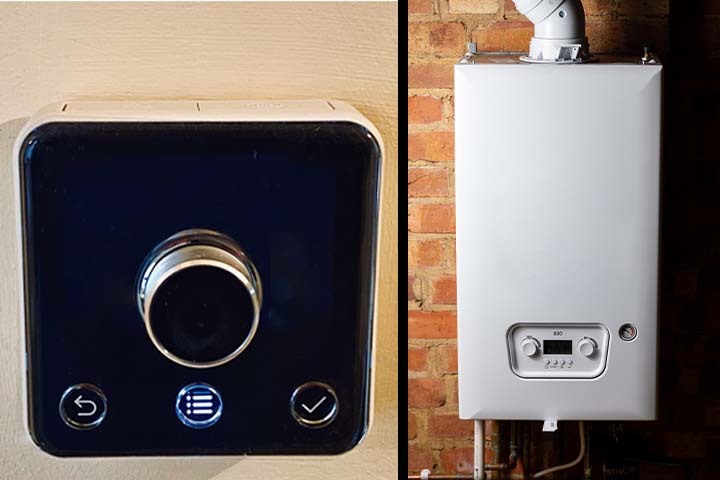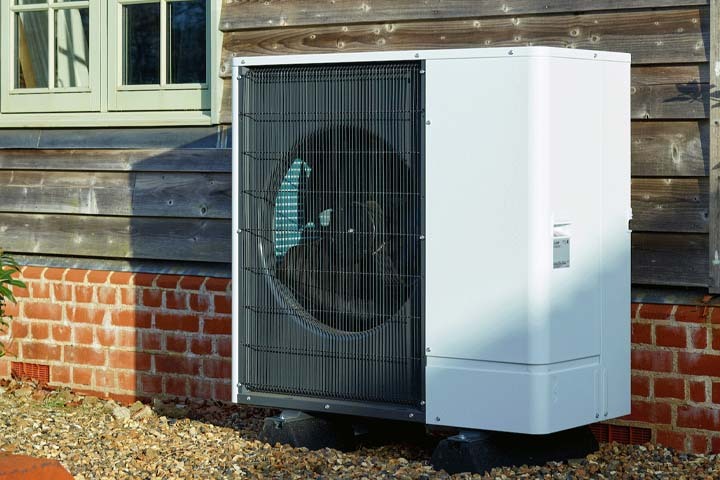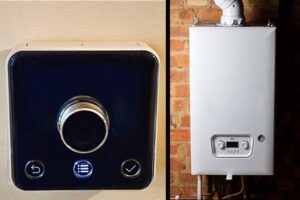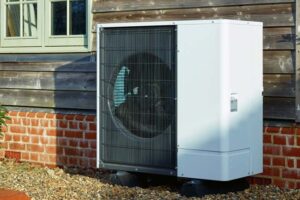Table of Contents
Are you moving to an old aesthetic building but looking to remove that energy inefficient back boiler which is giving you high energy bill shocks? That’s the sign you should get a government backed grant and upgrade your heating system to a modern and efficient one.
There are multiple grant for boilers to support the low income and low energy efficient households to improve their house’s energy efficiency, reduce the utility bills, and get a more comfortable temperature in their house.
This article will explore the most effective and popular back boiler removal grants to help you choose the right one for your home, as per your house’s requirements.
What is a Back Boiler and Why Should You Replace It?
A back boiler is a type of heating system that is typically found behind a residential fireplace. The back boiler uses the heat from the fire to warm water for central heating and hot water supply. A few years back, this system was considered very efficient as it used to provide room heat and hot water supply from the same fireplace. However, with climate change issues getting worse, all the heating systems involved in greenhouse gas emissions are emphasised to be replaced, including back boilers.
Reasons Why You Should Replace Back Boilers:
- Energy Inefficiency: Older back boilers are significantly less energy-efficient than modern boilers. They consume more energy to heat the same amount of water, leading to higher energy bills.
- Safety Concerns: Back boilers that are not well-maintained can pose safety risks, including the possibility of carbon monoxide leaks or system failures. This makes them a potential hazard in your home.
- Carbon Footprints: Due to their inefficiency, back boilers contribute to higher carbon emissions, making them less environmentally friendly and contributing to increased global warming and climate change.
- Free Replacements: Through various government schemes, such as ECO4 grants, UK government and local authorities replace your inefficient back boilers with efficient heating systems.
Grants Available to Replace Back Boiler
Considering the rising carbon emissions, fuel poverty for local residents, and inefficient heating systems, the UK government, local governments and councils provide various back boiler removal grants. Eligibility criteria for different government backed schemes is almost the same with minor changes. Below are a few back boiler removal grants and their eligibility criteria for better understanding the requirements.

1. Energy Company Obligations Phase 4 (ECO4) Scheme
Energy Company Obligations also known as ECO is the most effective and popular government grant to replace inefficient boilers with new and more energy efficient heating systems. This scheme gives grants on Low Income & Low Energy Efficient (LILEE) indicators, which helps identify low income households which are at high risk of fuel poverty.
Energy Company Obligations scheme started in 2013 to to help vulnerable households avoid fuel poverty and save on high energy bills. Later this scheme became part of national carbon emissions targets and continued with current phase 4 going on as ECO4. This scheme has a strict eligibility criteria so only vulnerable households can get the benefit of these grants.
Eligibility Criteria
Here is the Eligibility Criteria for Back Boiler Removal Grants:
- Qualifying Benefit Recipient
- Homeowner or Tenants With Landlord’s Permission
- Boiler Installed Before 2005 (Non-condensing)
- Gas Metre Installed Before April 2022
- Eligible Property Style
- EPC Rating D or Lower
In this eligibility criteria, the qualifying benefits includes Income Based – Jobseekers Allowance (JSA), Income Related – Employment and Support Allowance (ESA), Income Support Allowance (ISA), Working Tax Credit (WTC), Child tax credit (CTC), Universal Credit (UC), Pension Guarantee Credit, Pension Savings Credit, and Housing Benefits. Furthermore, the property type such as park homes, council property, and non-residential or social properties are not eligible for this scheme.
ECO4 offers Free Boiler Grants, which covers all sorts of boiler removal, replacements, or new heating system installations for qualifying households. However, meeting the eligibility criteria is necessary to get benefited by this scheme.
How We Can Help You Access Free Boiler Grants with ECO4
At Free Boilers Grants, we specialise in helping households access free boiler grants through the ECO4 scheme. As a certified ECO4 installer, we help you determine your eligibility, apply for the grant, and ensure your new boiler is installed quickly and efficiently. Our goal is to make upgrading your heating system as cost and hassle free as possible.
2. Boiler Upgrade Scheme 2 (HUG 2)
Under this scheme, low income and low energy efficient households get the grants to replace inefficient boilers with new energy efficient boilers. These grants provide financial support for installing energy-saving measures such as insulation and low-carbon heating systems through the local authorities.
Eligibility Criteria
The eligibility criteria for Boiler Upgrade Scheme 2 is as follows:
- Low-Income Households
- Households at risk of Fuel Poverty
- Off-Gas Grid Homes
- Vulnerable or Priority Groups
- Owner-Occupied Homes
- Energy Performance Certificate (EPC) Rating E, F, or G
Households meeting this eligibility criteria can avail inefficient heating systems replacement, insulation improvements, and low carbon emission heating systems installation with 100% funding. As HUG 2 is managed at local authority level, you can reach out to your councils for detailed information and requirements.
3. Sustainable Warmth Competition
Sustainable Warmth Competition is another locally managed grant for low income households in the UK to receive financial assistance to upgrade their inefficient boiler systems, including back boilers. This program is specifically designed for households who are off the gas grid or at high risk of fuel poverty.
Eligibility Criteria
Here is the eligibility criteria for the Sustainable Warmth Competition:
- Fuel poverty (households needing to spend more than 10% of their income on energy bills)
- Low-income households or vulnerable residents (e.g., elderly, disabled, families with young children)
- Poor Energy Performance Certificate (EPC) rating (typically E, F, or G)
- Off-gas grid homes
- Owner-occupied homes or private tenants (in some cases, landlords may be eligible)
- Properties in need of significant energy efficiency improvements
- Geographical focus (local authority-specific eligibility)
Households who meet the above mentioned criteria can receive funding for heating upgrades, insulation improvements, and draught proofing. You can contact the local councils for detailed information of your eligibility and any questions you may have.
4. Social Housing Decarbonisation Fund
Where other heating help schemes were excluding the social housings from home heating grants, Social Housing Decarbonisation Fund specifically entertained the social housings. This fund is available for housing providers to upgrade their homes with more energy efficient heating systems and get rid of high energy bills and fossil fuels. This scheme is also part of the UK government’s efforts towards reducing carbon emissions in residential buildings. It will help housing providers to upgrade their heating systems or get back boiler removal grants.
Eligibility Criteria
- Social housing providers
- Properties with poor energy efficiency (EPC ratings E, F, or G)
- Fuel-poor households
- Decarbonisation focus (low-carbon heating systems)
- Social housing tenants
This fund can be utilised for heating systems upgrades (including back boilers), new installations of low carbon heating systems and insulation requirements. However, you need to contact the local authorities for funding details and share your project details.
How to Ensure Maintenance and Longevity of the New Heating System?
Once you’ve replaced your back boiler, maintaining your new heating system properly is crucial to ensure its longevity and efficiency.
Here are some essential tips for ongoing maintenance:
- Annual Servicing: Schedule a professional service for your new heating system once a year. A qualified heating engineer can inspect the system, clean vital parts, and identify any potential issues early. This can prevent costly repairs down the line and ensure the system operates at its best.
- Flushing the System: Over time, sludge and debris can build up in your central heating system, reducing its efficiency. Regularly flushing the system to remove this buildup can keep it running smoothly and improve heat output.
- Checking the Pressure: Many modern boilers require a specific water pressure to operate correctly. Check the pressure gauge regularly and top it up if needed. If the pressure is too low or too high, it can lead to inefficiency or even damage to the system.
- Bleeding Radiators: If your radiators are not heating up properly, air may be trapped inside them. Bleeding your radiators removes this air, allowing them to heat up more effectively and distribute warmth throughout your home.
- Monitor Your Energy Usage: Keep an eye on your energy usage and compare it with previous years. If your energy consumption seems unusually high, it may indicate a problem with the system that requires maintenance.
- Replacing Parts When Needed: If certain parts of the system, like the pump or thermostat, begin to malfunction, replace them quickly to avoid further issues. Modern boilers often have a longer lifespan than older back boilers, but they still require attention.
Conclusion
To wrap up the discussion, while you are considering the back boiler removal, this is a great opportunity to upgrade your home heating system with the latest technologies. Whether you are tired of high energy bills or need to maintain a more comfortable temperature in your home, there are grants available for every minor or major upgrade, if you are eligible.
If your household requires major upgrades, you should consider ECO4 grants for your home, if you meet the criteria. However, in case of other scenarios like social housing or interest in local grants, you can contact your local councils and see if you are eligible.
This blog explores the effective grants available for residential households who are at risk of fuel poverty, need efficient heating systems, or are tired of high utility costs.
Frequently Asked Questions
It depends on the scheme you choose for the back boiler back boiler replacement. If you are qualified for the ECO4 scheme, it covers all the costs associated with boiler upgradation and you don’t have to worry about any additional costs. The installation costs will be directly paid to the installer.
If your application gets rejected, you will receive an explanation of the reasons behind it. You can work on those reasons and reapply for the grant. Otherwise, you contact local authorities, they might help you get hold of a government grant if you meet the LILEE (Low-income Low-energy-efficiency) indicator.
Yes, if tenants meet the eligibility criteria, they can apply for energy efficiency grants under the ECO4 scheme. Tenants should have written permission from the landlord before applying for these grants.








